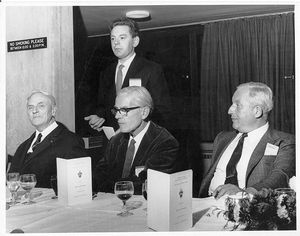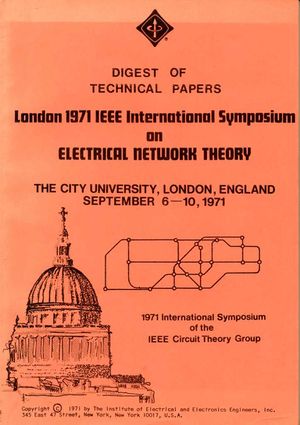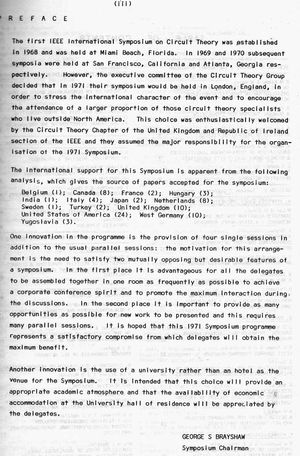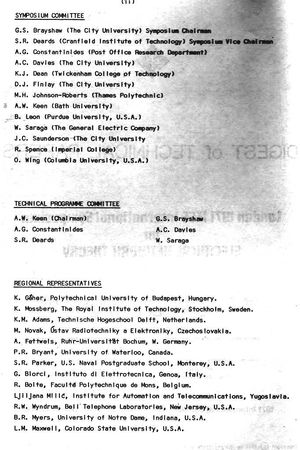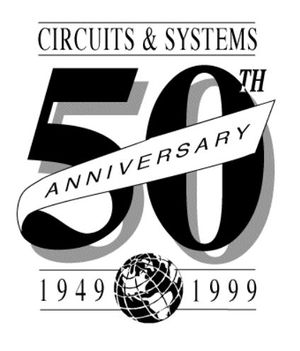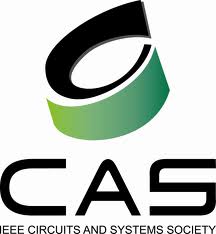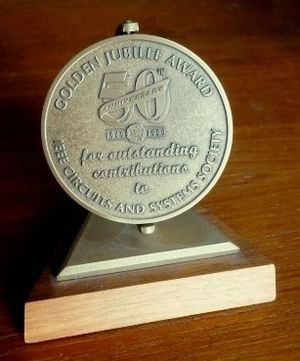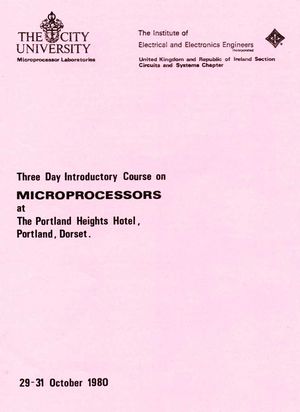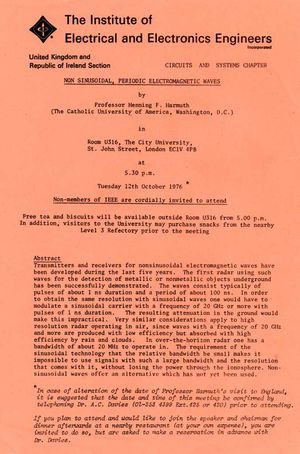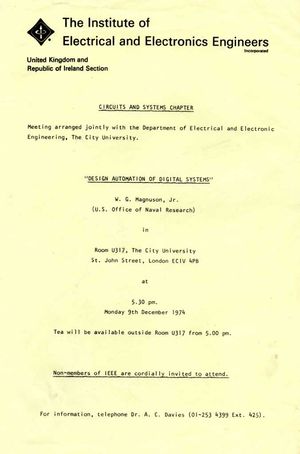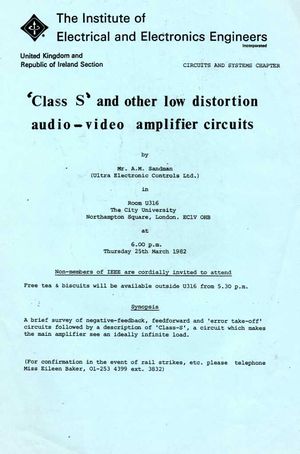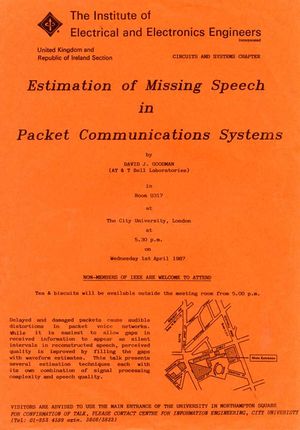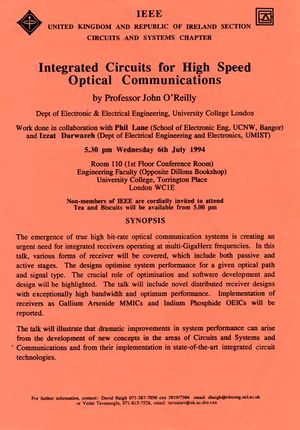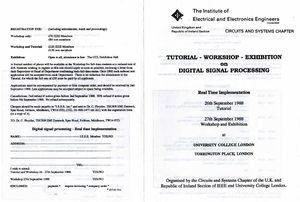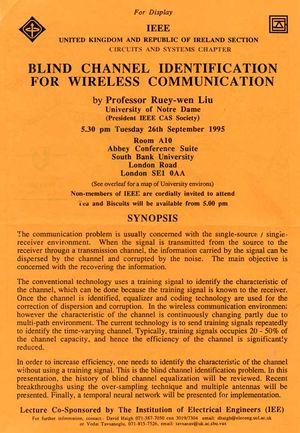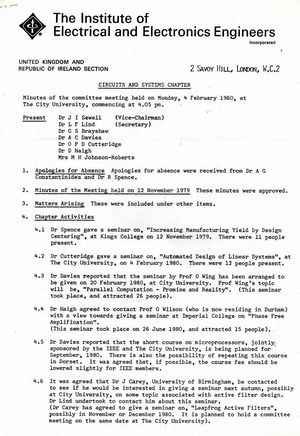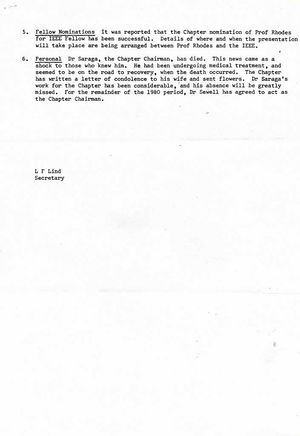IEEE UKRI Circuits and Systems Chapter History
A brief account of the activities of the IEEE U.K.R.I. CAS Chapter, 1970 to 1989
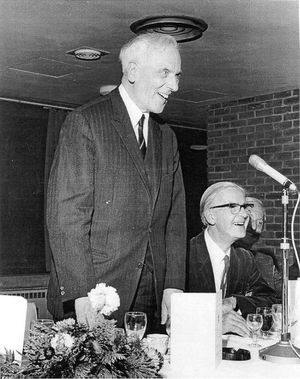
The Circuits and Systems (CAS) Chapter (formerly the Circuit Theory Chapter) was one of the first to be established in the U.K.R.I. Section, and the following paragraphs outline some of its main activities and style of operation, and also illustrate some of the constraints and opportunities facing a chapter in the Section.
The Chapter was founded by Dr. George S. Brayshaw (then a Reader at The City University, long-since retired and now deceased) who was its first chairman. The first major event was the initiation and organisation of the 1971 IEEE International Symposium on Electrical Network Theory, held in London. This was a huge task for a small Chapter to tackle, and was the first occasion that the Circuit Theory Group (now the CAS Society) had held its annual symposium outside the U.S.A. The success of the event led directly to the policy of holding it outside the U.S.A. at least every three years.
Evening lectures on a broad range of subjects (often by overseas visitors on short or long visits) have formed the main Chapter activity (usually several per year) and many distinguished people have been included in this programme (partial list attached). A majority have been held at The City University because of the need for a venue under the control of the organisers).
In 1975, the Chapter began running a series of low-cost Introductory short courses on Microprocessors. These were run as 'joint events' with The City University, because this provided a way to share the organisation and the financial risk, as well as enabling the University facilities to be provided at nominal cost. The objectives were to provide a needed service and not lose money. In the event, moderate surpluses were made despite the low fees charged (10 pounds for the first evening course of six lectures!), and these were shared equally between the IEEE Section and the University. Subsequently, the different and difficult financial and staffing situation of British universities meant that short-courses were and are now run with the primary objective of generating as large a surplus as possible, charging full costs for overheads and use of facilities, so that provision of such low-cost, value-for-money events in collaboration with IEEE is now unlikely to-occur very often (and it may be that recent financial changes would make it difficult for the IEEE U.K.R.I. Section to receive such income without the need to charge VAT, with associated costs of producing the required documentation).
For a number of years, the Chapter organised a one day 'preview' meeting of papers to be presented by authors from the U.K.R.I. area at the annual IEEE International Symposium on Circuits and Systems. Although this only covered a fraction of the papers at the real symposium, if appears to have been beneficial in giving authors a chance of a rehearsal and allowed those (especially students) who have no chance of getting travel funds to attend the real symposium to hear some of the contributions and meet a few of the participants.
Some low-cost one-day workshops were held during (on Local Area Networks, ISDN, DSP). Attendance was adequate to justify the events and cover costs (only by using subsidised university facilities, volunteer organisers, and limiting publicity to low-budget methods), but small in terms of the potential audience believed to exist.
Partial list of chapter chairmen:
- Dr. George S. Brayshaw
- Dr. Anthony C. Davies
- Dr. Wolja Saraga
- Dr. Jack I. Sewell
- Dr. Peter Bowron
Initially at least, it seems that there was no practice of having a Chapter Chair serving for a limited time of one or two years: they often seemed to serve until they had ‘enough’ and then stepped down if a suitable and willing replacement could be found. Probably no clear-cut election process either. It was long before the fast communications provided by the internet and e-mail, with most long-distance contact by air-mail letters, but there was an effective international network particularly among academics, and as a result the Chapter Committee normally became aware of professors, etc. well known in the Circuit Theory field who were on sabbatical or visiting conferences, etc. and could invite them to give lectures for the Chapter. This could be arranged at very short notice for the Chapter (or the U.K.R.I. Section). This was a substantial advantage over the national Institutions (such as IEE) since the latter had long-duration budget and event planning processes and generally needed very long lead times to arrange anything. From the list which follows, it can be seen that lecturers arranged by the IEEE Chapter were drawn from a wide range of international locations. Also notable is that several of those invited subsequently were elected to high-level volunteer positions in IEEE, including IEEE President. It was always the practice to encourage attendance by all, and to welcome non-members of IEEE. Although attendance records were normally made, it is unlikely that these have survived.
A list of events held in the early days of the IEEE U.K.R.I. Circuits and Systems Chapter
Examples of events organised up to 1989 (Note: this list is NOT complete!):
location codes:
- IEE - IEE, Savoy Place, London
- TCU - The City University, London
- IC - Imperial College, London
- PCL - Polytechnic of Central London (now this is University of Westminster)
- UCL - University College, London
- KCL - Kings College, London
- UE - Essex University, Colchester
- PD - Portland Heights Hotel, Dorset
London 1971 IEEE Int. Symposium on Electrical Network Theory at The City University, London. 6th-10th Sept 1971.
A survey of Computer Aided Circuit Design, Lecture by George Zobrist (Univ of South Florida). 29th March 1973 (TCU)
Input-output stability of single and multiple loop feedback systems, Lecture by Charles A. Desoer (Univ. of California, Berkeley). 16th April 1973 (IC)
Digital Code Conversion as an approach to source encoding, Lecture by David J. Goodman (Bell Labs). 18th May 1973 (IC)
The Design of RC circuits for integrated circuit fabrication, Lecture by Richard A. Stein (Univ. of Calgary, Canada). 29th June 1973. (TCU)
A Closer Look at Ring Diode Modulators, Lecture by John Hanson (Univ of Waterloo, Canada). 17th December 1973 (lEE) .
Design Automation of Digital Systems, Lecture by W. G. Magnuson (U.S. Office of Naval Research). 9th Dec 1974. (TCU)
Computer-oriented Circuit Design, Lecture by Franklin F. Kuo (University of Hawaii) 20th December 1974 (TCU)
Minimal Realisation of Gyrators, Lecture by M. Silva (Lisbon University, Portugal). 15th October 1975. (TCU)
Wot's Watand? Lecture by Peter R. Bryant (Univ. of Waterloo, Canada). 3rd June 1975. (TCU)
Introduction to Microprocessors, Evening Course of six weekly lectures, at The City University; London, Autumn 1975
(followed by a number of two day courses on aspects of microprocessors held over the next few years: …. 11-12th March 1976, 4-5th October 1976 .. 4-5th April 1977, 18-19th July 1977, 10-11th April 1978, 27-28th June 1978........ )
Computer Aided Circuit Design; Design Centering and Tolerance Assignment in the convex case, Lecture by Robert. K. Brayton (IBM T.J.Watson Researcti Center, N.J.) 16th March 1976. (TCU)
Symbolic Network Analysis: Some Methods and Improvements, Lecture by Jack I Sewell (Univ. of Hull, England), 26th May 1976 (TCU)
Non-sinusoidal periodic electromagnetic waves, Lecture by Henning F. Harmuth (Catholic Univ of America, Washington D.C.), 12th October 1976. (TCU) .
Microprocessor Update, Lecture by Daniel R. McGlynn (United States Philips Corp). 22 Feb 1977. (the largest attendance of any lecture held by the chapter) (TCU)
Fault Isolation: Computer methods- where do we stand? Lecture by Ricardo F. Garzia, Babcock and Wilcox, U.S.A. 8th July 1977 (TCU)
Conference on CAD of Electronic and Microwave Circuits and Systems at University of Hull, 12-14th July 1977.
Design of frequency division multiplexers, Lecture by J. David Rhodes (Univ. of Leeds). 31st May 1978 (UE)
Timing Recovery Circuits for PAM Carrier Systems, Lecture by Lou E Franks (Univ. of . Massachusetts, Amherst), 21st Mar 1979 (IC)
Digital Image Processing in Biomedical Systems, Lecture by Louis Nardizzi (Southern Methodist Oniv. Dallas, Texas), 26th March 1979 (TCU)
Digital Processing of Narrow-Band Signals, Lecture by Bede Liu (Princeton Univ. N.J., U.S.A.) 9th May 1979 (PCL)
lncreasing Manufacturing Yield by Design Centreing, Lecture by Robert Spence (Imperial College, London) 12th November 1979 (KCL)
Automated Design of Linear Systems, Lecture by O.P.D.Cutteridge (Univ. of Leicester, England), 4th Feb 1980 (TCU)
Parallel Computation - promise and reality, Lecture by Omar Wing (Columbia University, New York), 20th February 1980 (TCU)
Phase free amplification, Lecture by G. Wilson (James Cook University, N. Queensland, Australia), 26th June 1980 (IC)
Microprocessor Course (at Portland, Dorset), 29th-31st October 1980 (PD)
Leapfrog Active Filters, Lecture by John R. Carey (Univ. of Birmingham, England), 9th December 1980 (TCU) .
Personal Computer Local Networks, Lecture by Daniel McGlynn (D. McGlynn Associates, Anaheim, California), 10th January 1981 (Saturday!) (TCU)
Microprocessor Course (at Portland, Dorset), 22th-24th September 1981 (PD)
Symbolic Network Functions and Symbolic Analysis, Lecture by Masahiko Sagawa (Tokyo Metropolitan University), 14th December 1981 (IC)
Filters for Data Transmission, Lecture by L.F.Lind (University of Essex), 24th February 1982 (PCL)
'Class S' and other low distortion audio-video amplifier circuits, Lecture by A.M.Sandman (Ultra Electronic Controls, Ltd.), 25th March 1982 (TCU)
Digital Interpolation and Decimation, Lecture by A.G.Constantinides (Imperial College), 30fh April 1982 (IC) .
New trends in teaching Circuits and Systems. Discussion led by Ernie S. Kuh (Univ. of California, Berkeley), 26th May 1982 (lC)
.A discussion and demonstration of Wave Digital Filters using modern LSI components, by S.S.Lawson (The City University) 2nd June 1982 (TCU)
Workshop on Design and fabrication of integrated circuit filters Imperial College, London, 15th September 1982 (IC)
Test Generation for VLSI Lecture by Peter J. Miller (Control & Readout Ltd, England), 15th December 1982
SCADS: A new CAD package with new facilities, Lecture by A. lIumoka, R. Spence, J. Burgess (Imperial College) 23rd February 1983
Filters on a chip: switched capacltor filters, Lecture by George S. Moschytz (E.T.H. Zurich, Switzerland) 13th April 1983
Goals, Constraints and Trade-offs in Digital Communications Systems, Lecture by Bernard Sklar, (The Aerospace Corp. El Segundo, California) 15th June 1983 (TCU)
Narrow Bandpass switched capacitor filter systems, Lecture by Jose E Franca (Inst. Superior Tecnica, Lisbon, Portugal) 9th Nov. 1983 (IC) .
The Bath Gate Array, Lecture by Stan Hurst (Bath Univ.) and Paul Jennings 14th Dec. 1983 (IC)
A close look at the Twin-T oscillator, Lecture by Kal Fidler (Open University, Milton Keynes, England) 29th February 1984
Circuits and Systems 1984 - a preview of U.K. contributions to the 19841SCAS. 26th April 1984 (IC)
VLSI Switched Capacitor Networks and Applications, Lecture by Kenneth R. Laker (Bell Communications Research, N.J.) 13th July 1984 (IC)
Which is the best filter? - An old question, and a new answer, Lecture by M Silva (Lisbon Univ. Portugal) 10th October 1984 (IC)
About such things as Invariance; Unilateral Gain and Absolute Stability, Lecture by John Rollett (BT Research Labs, Martlesham, England) 17th Dec 1984 (IC)
Circuits and Systems 1985 - a preview of U.K. contributions to the 1985 ISCAS, 30th May 1985 (IC)
Design of fully integrated high frequency analog filters, Lecture by Rolf Schaumann (Univ. of Minnesota), 11th Sept. 1985 (IC)
Workshop on Local Area Networks, The City University, London, 10th September 1985 VLSI - The CAD Challenge, Lecture by Rob E Massara (Univ of Essex, Colchester, England) 18th December 1985 (IC)
Circuits and Systems 1986 - a preview of U.K. contributions to the 19861SCAS, 24th April 1986 (TCU)
Implementation of Digital Signal Processing Software with the TMS 320 Family: Lecture/Demonstration by Andrew Christofi et. al (Texas Instruments), 27th November 1986 (TCU)
Recent Advances in Real-time Simulation, Lecture by L. Grant (Marconi Instruments, Dumfermline, Scotland) 17th December 1986 (TCU)
Testability Measures for Digital VLSI, Lecture by Gaynor E Taylor (Univ. of Hull, England), 3rd March 1987 (TCU)
Estimation of Missing Speech in Packet Communications Systems, Lecture by David J. Goodman (A.T. & T. Bell Labs, N.J.), 1st April 1987 (TCU)
Circuits and Systems 1987 - a preview of U.K. contributions to the 1977 ISCAS. 22nd April 1987 (TCU)
Workshop on ISDN and Integrated Voice-Data Communications, The City University, London, 24th September 1981
Synthesis of Speech-like Sounds, Lecture by P.M. Hughes, British Telecom Research Labs, England. 16th December 1987 (UCL)
Neuron lookalikes, Lecture by Richard V Aldridge, Univ. of East Anglia, England. 8th March 1988 (UCL)
Circuits and Systems 1988 - a preview of U.K. contributions to the 1977 ISCAS.17th May 1988 (UCL)
Tutorial- Workshop - Exhibition on Digital Signal Processing, University College London, 26th-27th September 1988
Glitches and Metastable Transients in Flip-flops, Lecture by A.C.Davies (The City University, London) 12th December 1988 (UCL)
Circuits and Systems 1989 - a preview of U.K. contributions to the 1989 ISCAS. 26th April 1989 (UCL)
A selection of a few of the posters prepared for such lectures, etc. is shown on later pages. It was ‘normal’ to make up such posters and distribute them in the hope that they would be posted on noticeboards in universities and companies and so encourage attendance. Just sending out e-mail messages is often considered sufficient nowadays, of course ! Also shown is one example of the Minutes of the Chapter Committee, from a meeting in February 1980.
One session of the Symposium was held in the building of the Institution of Electrical Engineers (IEE), with the participants being transported there by chartered buses. Partly this was to emphasise the technical co-sponsorship with IEE, partly to enable the delegates to visit this impressive Thames-side building and partly to offset an impression that some of the ‘middle-level’ IEE staff were quite upset at what they felt was an ‘intrusion’ of IEEE to organize conferences in what they felt was the IEE Geographical domain (e.g. the British Isles).
The next occasion that the CAS Society’s annual symposium was held in the U.K.R.I. Section was in 1994, with Prof. R Spence as General Chair, who had been a member of the Organising Committee for the 1971 symposium. It was held in central London, and the Conference Banquet was at the London Guildhall.
The CAS Logo used for many years is shown here; note that the initials C, A, S can all be found within it’. For 1999, to commemorate the 50th Anniversary of the foundation of the CAS Society (as the IRE Circuit Theory Group) a special logo was used (also shown here) and also a number of members of the Society were awarded a Golden Jubilee Medal.
